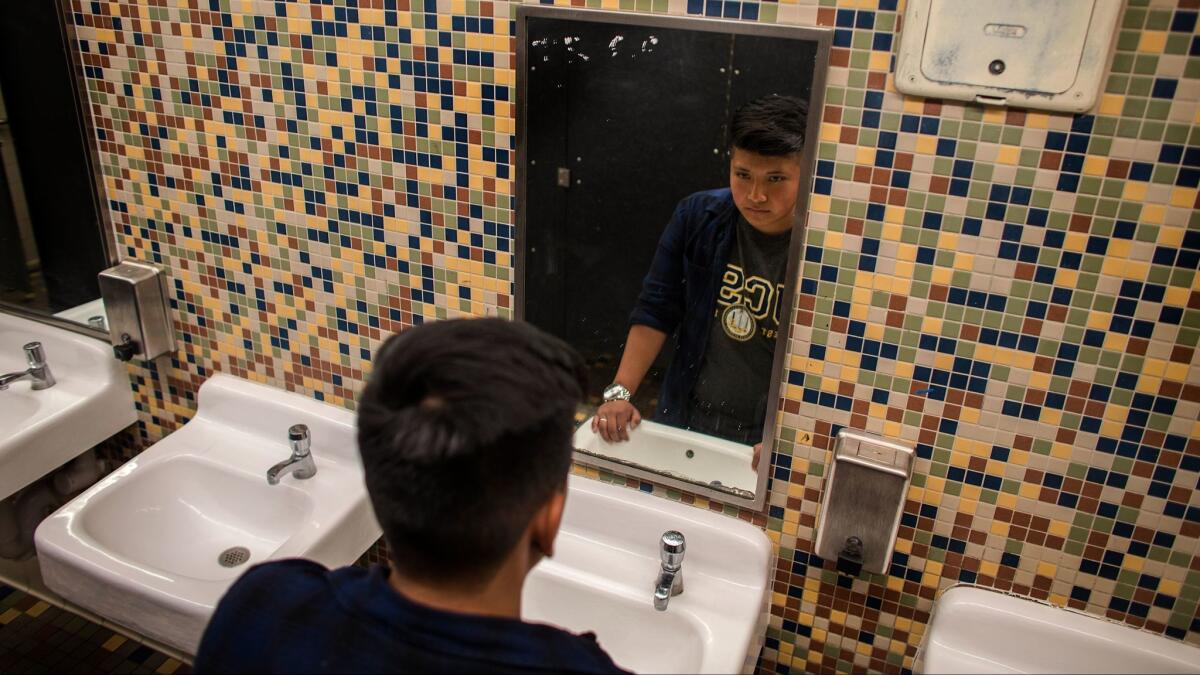‘He is the face of the country but we are the country.’ Students and teachers react to Trump’s win

- Share via
Alonzo Hernandez is a 17-year-old transgender Latino living in South L.A.
When he realized that Donald Trump would become president on Tuesday night, he said, “I didn’t want to speak, I didn’t want to say anything.” But like hundreds of thousands of other students in heavily liberal Los Angeles, he had to go to school and face the facts the next morning.
So did his teachers, who had to figure out how to cope not just with their own feelings but with young people who might feel especially vulnerable.
“I reminded them our country has been through darker times,” said Randall Bustamante, a leadership and ethnic studies teacher at Santee Education Complex, where Alonzo is a senior. The school is 92% Latino, and in his first-period ethnic studies class, Bustamante fielded questions including “Is he really going to deport everyone?”
Bustamante showed the class CNN political commentator Van Jones’ interview with a family of Trump supporters so they could understand on a more personal level why people had supported the president-elect, and he talked of organized action.
He could have taken the conciliatory road that many Trump opponents were traveling Wednesday morning. But he said he wanted his students to voice their feelings and understand they had a role to play in the nation’s democracy.
Such messages gave Alonzo some hope. He is organizing a walk-out on Monday to protest Trump’s victory.
“He is the face of the country, but we are the country,” Alonzo said. “We are the people.”
At Downtown Magnets High School, history teacher Stephanie Jacob said that in 19 years of teaching — including her time in a Virginia military town after 9/11— she has never seen such a big reaction from students.
One student made a comment saying that it was like when Scar was on Pride Rock. They said, ‘We want Mufasa back.’
— Jonathan Vickburg, a therapist who counsels students in South L.A. schools
“My kids are coming to me for hugs and cries and everything else,” Jacob said, but she can’t know what the future holds. “Not being able to answer their questions and give them any comfort or security is really, really hard.”
Jacob said she wanted to make sure her classes understood the democratic process. “I told them you find your cause and you fight for it.”
Across the city at Van Nuys Middle School, 8th-grade history teacher Noemi Morales told her students of her own anxieties when she was their age during the Cold War. “It’s my job to make sure you’re safe,” she said. “I’m on your side. I’m your advocate.”
“I’m not really scared of his racism,” said one student in Morales’ class. “We’re just scared as Latinos that he’s going to take people from our families that don’t have papers or visas ... that they could take your aunt, your uncle, or your brother.”
Jonathan Vickburg, a therapist who counsels students in South L.A. schools through the Cedars-Sinai Psychological Trauma Center, spoke with high school students on Wednesday. They ended up talking about self-care, democracy and “The Lion King.”
“One student made a comment saying that it was like when Scar was on Pride Rock,” Vickburg said. “They said, ‘We want Mufasa back.’”
In L.A. Unified, a district where three-fourths of students are Latino but a third of teachers are white, talking frankly to a white teacher or counselor might be hard, Vickburg said.
“All I can do is do my best to listen, be there, not get defensive with it, and try to be another person they can have an open conversation [with],” Vickburg said.
Teachers should ask students what they need, Vickburg said.
For the youngest students, needs can be hard to gauge.
Marcia Reed, principal at 186th Street Elementary in South L.A., said some of her students came in expressing sadness. In the school’s mock election, after all, Hillary Clinton had won easily.
“We’re going to move forward and remain respectful,” Reed said. “The message we’re giving our kids is we’re grateful that we all had choices.”
To read the article in Spanish, click here
You can reach Joy Resmovits on Twitter @Joy_Resmovits and by email at Joy.Resmovits@LATimes.com.
More to Read
Sign up for Essential California
The most important California stories and recommendations in your inbox every morning.
You may occasionally receive promotional content from the Los Angeles Times.















